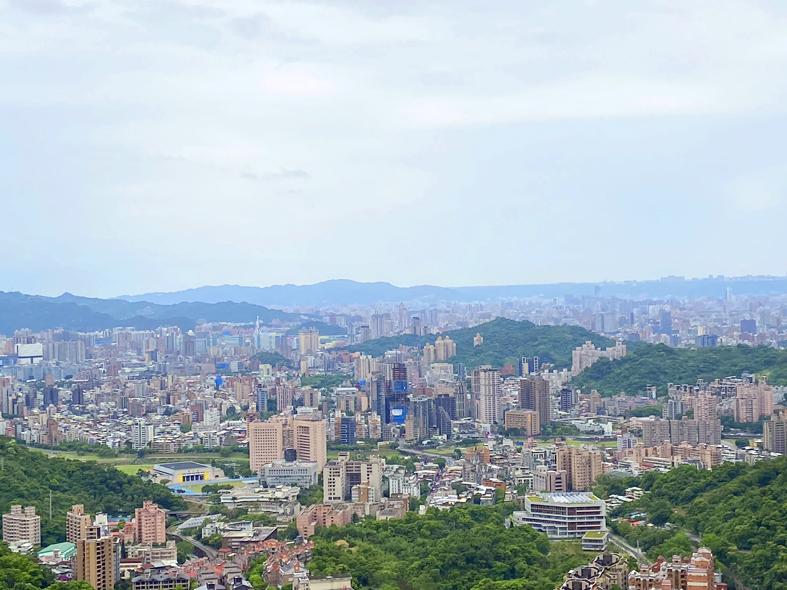The number of presale and new housing units on the market declined last quarter from the previous quarter, but selling prices continued to climb, defying policy measures to reverse the trend, a survey by Cathay Real Estate Development Co (國泰建設) showed yesterday.
The number of presale and new housing projects fell 22 percent from the fourth quarter of last year to 230 projects, while the overall number of housing units on the market fell 7.6 percent to 21,812, the quarterly survey showed.
The Taipei-based developer attributed the retreat to tightening measures by government agencies to rein in the property market.

Photo: Hsu Yi-ping, Taipei Times
The central bank cut its loan-to-value ratios twice in the first quarter to 40 percent for corporate buyers and people who own four homes to make the market less attractive for speculative buyers, while the Ministry of Finance raised capital gains taxes to between 35 and 45 percent on properties resold within five years of purchase.
The finance ministry is also to levy punitive taxes on contract transfers for presale projects from July 1.
The housing market appeared to have cooled down in Taoyuan, Hsinchu City, Taichung, Tainan and Kaohsiung, judging by the supply, Cathay Real Estate said.
However, selling prices picked up as developers sought to pass rising raw material and labor costs to buyers, the analyst said, adding that it is too early to assess the impact of policies.
Housing prices averaged NT$308,100 per ping (3.3m2) nationwide, gaining 2.01 percent from three months earlier, while 30-day sales rates shed 2.41 percentage points to 11.71 percent, it said. Meanwhile, the room for price concessions widened by 0.79 percentage points to 13.45 percent, it added.
That meant the supply side grew more flexible in pricing to facilitate transactions, as lawmakers consider imposing hoarding taxes on multiple-home owners and the Ministry of the Interior plans revisions to public space requirement in residential complexes.
Taichung reported the steepest price hike of 3.62 percent to NT$266,400 per ping last quarter, as the city benefitted from the inauguration of its mass rapid transit system, the survey showed.
Hsinchu posted the second-steepest raise of 3.29 percent to NT$257,200 per ping, it showed
Prices in Taipei increased 2.78 percent to NT$889,800 per ping and those in New Taipei City advanced 0.51 percent to NT$402,400 per ping, while prices gained 0.68 percent to NT$269,000 per ping in Taoyuan, the survey showed.
Prices in Tainan rose 0.55 percent to NT$236,600 per ping, while prices in Kaohsiung increased 0.46 percent to NT$240,700 per ping, it showed.

‘SWASTICAR’: Tesla CEO Elon Musk’s close association with Donald Trump has prompted opponents to brand him a ‘Nazi’ and resulted in a dramatic drop in sales Demonstrators descended on Tesla Inc dealerships across the US, and in Europe and Canada on Saturday to protest company chief Elon Musk, who has amassed extraordinary power as a top adviser to US President Donald Trump. Waving signs with messages such as “Musk is stealing our money” and “Reclaim our country,” the protests largely took place peacefully following fiery episodes of vandalism on Tesla vehicles, dealerships and other facilities in recent weeks that US officials have denounced as terrorism. Hundreds rallied on Saturday outside the Tesla dealership in Manhattan. Some blasted Musk, the world’s richest man, while others demanded the shuttering of his

TIGHT-LIPPED: UMC said it had no merger plans at the moment, after Nikkei Asia reported that the firm and GlobalFoundries were considering restarting merger talks United Microelectronics Corp (UMC, 聯電), the world’s No. 4 contract chipmaker, yesterday launched a new US$5 billion 12-inch chip factory in Singapore as part of its latest effort to diversify its manufacturing footprint amid growing geopolitical risks. The new factory, adjacent to UMC’s existing Singapore fab in the Pasir Res Wafer Fab Park, is scheduled to enter volume production next year, utilizing mature 22-nanometer and 28-nanometer process technologies, UMC said in a statement. The company plans to invest US$5 billion during the first phase of the new fab, which would have an installed capacity of 30,000 12-inch wafers per month, it said. The

Taiwan’s official purchasing managers’ index (PMI) last month rose 0.2 percentage points to 54.2, in a second consecutive month of expansion, thanks to front-loading demand intended to avoid potential US tariff hikes, the Chung-Hua Institution for Economic Research (CIER, 中華經濟研究院) said yesterday. While short-term demand appeared robust, uncertainties rose due to US President Donald Trump’s unpredictable trade policy, CIER president Lien Hsien-ming (連賢明) told a news conference in Taipei. Taiwan’s economy this year would be characterized by high-level fluctuations and the volatility would be wilder than most expect, Lien said Demand for electronics, particularly semiconductors, continues to benefit from US technology giants’ effort

MULTIFACETED: A task force has analyzed possible scenarios and created responses to assist domestic industries in dealing with US tariffs, the economics minister said The Executive Yuan is tomorrow to announce countermeasures to US President Donald Trump’s planned reciprocal tariffs, although the details of the plan would not be made public until Monday next week, Minister of Economic Affairs J.W. Kuo (郭智輝) said yesterday. The Cabinet established an economic and trade task force in November last year to deal with US trade and tariff related issues, Kuo told reporters outside the legislature in Taipei. The task force has been analyzing and evaluating all kinds of scenarios to identify suitable responses and determine how best to assist domestic industries in managing the effects of Trump’s tariffs, he